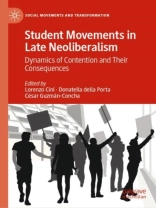This book inquires into the global wave of student mobilizations that have arisen in the aftermath of the economic crisis of 2008, accounting for their historical and sociological significance. More specifically, its eleven chapters explore the role of students as political actors: their ability to build effective organizations, to make political alliances with other actors, and to win public consensus, as well as their impact on cultural, political, and policy outcomes. To do so, the volume examines case studies in England, Chile, South Africa, Quebec, and Hong Kong, covering Europe, Africa, Asia, and North and Latin America. Grouped into two major sections, the collection covers the organizational structures of student movements and their alliances and outcomes. Ultimately, this volume examines the understudied political aspects of student unrest, exploring how student mobilizations—driven by indebtedness, precariousness, the corporatization of the university, and other issues—correspond to larger processes of change with wider implications in society.
قائمة المحتويات
1. Student movements in late neoliberalism. Forms of organizing, alliances, and outcomes (Lorenzo Cini, Donatella della Porta, and César Guzmán-Concha).- 2. What moves students? Ritual versus reactive student demonstrations in Mexico City (María Inclán).- 3. Contentious institutionalized movements: the case of the student movement in Quebec (Luc Chicoine and Marcos Ancelovici).- 4. Structuring the “structureless” and leading the “leaderless”: power and organization in the student movement at the University of California (Sarah L. Augusto).- 5. Tweeting #Fees Must Fall: The online life and offline protests of a networked student movement (Thierry M Luescher, Nkululeko Makhubu, Thelma Oppelt, Seipati Mokhema and Memory Zodwa Radasi).- 6. Movement leadership in an era of connective action: a study of Hong Kong’s student-led Umbrella Movement (Chi-shun Fong and Samson Yuen).- 7. From the classrooms to the roofs: the 2010 university researchers’ movement in Italy (Gianni Piazza).- 8. Worker-student unity against outsourcing at the University of Johannesburg: disrupting the neoliberal paradigm through direct action and alternative relations (Francesco Pontarelli).- 9. From revolt to reform: student protests and the higher education agenda in England 2009-2019 (Hector Rios-Jara).- 10. Chile’s student movement: strong, detached, influential … and declining? (Nicolás M. Somma and Sofía Donoso).- 11. Ever failed? Fail again, fail better: tuition protests in Germany, Turkey, and the United States (Didem Türkoğlu).
عن المؤلف
Lorenzo Cini is a political sociologist on the Faculty of Political and Social Sciences of the Scuola Normale Superiore of Florence, Italy.
Donatella della Porta is Professor of Political Science, Dean of the Faculty of Political and Social Sciences, and Director of the Ph D program in Political Science and Sociology at the Scuola Normale Superiore in Florence, Italy.
César Guzmán-Concha is a Marie Skłodowska-Curie Fellow at the University of Geneva, Switzerland.












